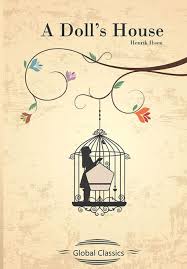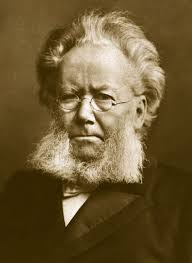A Doll's House Page #4
A Doll's House is a three-act play written by Henrik Ibsen. It premiered at the Royal Theatre in Copenhagen, Denmark, on 21 December 1879, having been published earlier that month. The play is set in the home of the Helmer family in an unspecified Norwegian town or city, circa 1879 and focuses on the awakening of a middle-class wife and mother.
Mrs. Linde. Because you couldn't have borrowed it. Nora. Couldn't I? Why not? Mrs. Linde. No, a wife cannot borrow without her husband's consent. Nora (tossing her head). Oh, if it is a wife who has any head for business--a wife who has the wit to be a little bit clever-- Mrs. Linde. I don't understand it at all, Nora. Nora. There is no need you should. I never said I had borrowed the money. I may have got it some other way. (Lies back on the sofa.) Perhaps I got it from some other admirer. When anyone is as attractive as I am-- Mrs. Linde. You are a mad creature. Nora. Now, you know you're full of curiosity, Christine. Mrs. Linde. Listen to me, Nora dear. Haven't you been a little bit imprudent? Nora (sits up straight). Is it imprudent to save your husband's life? Mrs. Linde. It seems to me imprudent, without his knowledge, to-- Nora. But it was absolutely necessary that he should not know! My goodness, can't you understand that? It was necessary he should have no idea what a dangerous condition he was in. It was to me that the doctors came and said that his life was in danger, and that the only thing to save him was to live in the south. Do you suppose I didn't try, first of all, to get what I wanted as if it were for myself? I told him how much I should love to travel abroad like other young wives; I tried tears and entreaties with him; I told him that he ought to remember the condition I was in, and that he ought to be kind and indulgent to me; I even hinted that he might raise a loan. That nearly made him angry, Christine. He said I was thoughtless, and that it was his duty as my husband not to indulge me in my whims and caprices--as I believe he called them. Very well, I thought, you must be saved--and that was how I came to devise a way out of the difficulty-- Mrs. Linde. And did your husband never get to know from your father that the money had not come from him? Nora. No, never. Papa died just at that time. I had meant to let him into the secret and beg him never to reveal it. But he was so ill then--alas, there never was any need to tell him. Mrs. Linde. And since then have you never told your secret to your husband? Nora. Good Heavens, no! How could you think so? A man who has such strong opinions about these things! And besides, how painful and humiliating it would be for Torvald, with his manly independence, to know that he owed me anything! It would upset our mutual relations altogether; our beautiful happy home would no longer be what it is now. Mrs. Linde. Do you mean never to tell him about it? Nora (meditatively, and with a half smile). Yes--someday, perhaps, after many years, when I am no longer as nice-looking as I am now. Don't laugh at me! I mean, of course, when Torvald is no longer as devoted to me as he is now; when my dancing and dressing-up and reciting have palled on him; then it may be a good thing to have something in reserve--(Breaking off.) What nonsense! That time will never come. Now, what do you think of my great secret, Christine? Do you still think I am of no use? I can tell you, too, that this affair has caused me a lot of worry. It has been by no means easy for me to meet my engagements punctually. I may tell you that there is something that is called, in business, quarterly interest, and another thing called payment in installments, and it is always so dreadfully difficult to manage them. I have had to save a little here and there, where I could, you understand. I have not been able to put aside much from my housekeeping money, for Torvald must have a good table. I couldn't let my children be shabbily dressed; I have felt obliged to use up all he gave me for them, the sweet little darlings! Mrs. Linde. So it has all had to come out of your own necessaries of life, poor Nora? Nora. Of course. Besides, I was the one responsible for it. Whenever Torvald has given me money for new dresses and such things, I have never spent more than half of it; I have always bought the simplest and cheapest things. Thank Heaven, any clothes look well on me, and so Torvald has never noticed it. But it was often very hard on me, Christine--because it is delightful to be really well dressed, isn't it? Mrs. Linde. Quite so. Nora. Well, then I have found other ways of earning money. Last winter I was lucky enough to get a lot of copying to do; so I locked myself up and sat writing every evening until quite late at night. Many a time I was desperately tired; but all the same it was a tremendous pleasure to sit there working and earning money. It was like being a man. Mrs. Linde. How much have you been able to pay off in that way? Nora. I can't tell you exactly. You see, it is very difficult to keep an account of a business matter of that kind. I only know that I have paid every penny that I could scrape together. Many a time I was at my wits' end. (Smiles.) Then I used to sit here and imagine that a rich old gentleman had fallen in love with me-- Mrs. Linde. What! Who was it? Nora. Be quiet!--that he had died; and that when his will was opened it contained, written in big letters, the instruction: "The lovely Mrs. Nora Helmer is to have all I possess paid over to her at once in cash." Mrs. Linde. But, my dear Nora--who could the man be? Nora. Good gracious, can't you understand? There was no old gentleman at all; it was only something that I used to sit here and imagine, when I couldn't think of any way of procuring money. But it's all the same now; the tiresome old person can stay where he is, as far as I am concerned; I don't care about him or his will either, for I am free from care now. (Jumps up.) My goodness, it's delightful to think of, Christine! Free from care! To be able to be free from care, quite free from care; to be able to play and romp with the children; to be able to keep the house beautifully and have everything just as Torvald likes it! And, think of it, soon the spring will come and the big blue sky! Perhaps we shall be able to take a little trip--perhaps I shall see the sea again! Oh, it's a wonderful thing to be alive and be happy. (A bell is heard in the hall.) Mrs. Linde (rising). There is the bell; perhaps I had better go. Nora. No, don't go; no one will come in here; it is sure to be for Torvald. Servant (at the hall door). Excuse me, ma'am--there is a gentleman to see the master, and as the doctor is with him-- Nora. Who is it? Krogstad (at the door). It is I, Mrs. Helmer. (Mrs. LINDE starts, trembles, and turns to the window.) Nora (takes a step towards him, and speaks in a strained, low voice). You? What is it? What do you want to see my husband about? Krogstad. Bank business--in a way. I have a small post in the Bank, and I hear your husband is to be our chief now-- Nora. Then it is-- Krogstad. Nothing but dry business matters, Mrs. Helmer; absolutely nothing else. Nora. Be so good as to go into the study, then. (She bows indifferently to him and shuts the door into the hall; then comes back and makes up the fire in the stove.)
Translation
Translate and read this book in other languages:
Select another language:
- - Select -
- 简体中文 (Chinese - Simplified)
- 繁體中文 (Chinese - Traditional)
- Español (Spanish)
- Esperanto (Esperanto)
- 日本語 (Japanese)
- Português (Portuguese)
- Deutsch (German)
- العربية (Arabic)
- Français (French)
- Русский (Russian)
- ಕನ್ನಡ (Kannada)
- 한국어 (Korean)
- עברית (Hebrew)
- Gaeilge (Irish)
- Українська (Ukrainian)
- اردو (Urdu)
- Magyar (Hungarian)
- मानक हिन्दी (Hindi)
- Indonesia (Indonesian)
- Italiano (Italian)
- தமிழ் (Tamil)
- Türkçe (Turkish)
- తెలుగు (Telugu)
- ภาษาไทย (Thai)
- Tiếng Việt (Vietnamese)
- Čeština (Czech)
- Polski (Polish)
- Bahasa Indonesia (Indonesian)
- Românește (Romanian)
- Nederlands (Dutch)
- Ελληνικά (Greek)
- Latinum (Latin)
- Svenska (Swedish)
- Dansk (Danish)
- Suomi (Finnish)
- فارسی (Persian)
- ייִדיש (Yiddish)
- հայերեն (Armenian)
- Norsk (Norwegian)
- English (English)
Citation
Use the citation below to add this book to your bibliography:
Style:MLAChicagoAPA
"A Doll's House Books." Literature.com. STANDS4 LLC, 2024. Web. 22 Dec. 2024. <https://www.literature.com/book/a_doll%27s_house_400>.




Discuss this A Doll's House book with the community:
Report Comment
We're doing our best to make sure our content is useful, accurate and safe.
If by any chance you spot an inappropriate comment while navigating through our website please use this form to let us know, and we'll take care of it shortly.
Attachment
You need to be logged in to favorite.
Log In